Begin your free Illinois warrant search by gaining immediate access to a range of extensive databases and public record sources online.
Information about wanted individuals throughout the state is available thanks to both state and federal public record laws.
This streamlined resource provides in-depth guidance on how to find existing warrants in the state of Illinois through various local and state government agencies.
Are Warrants Available for Illinois Citizens To View?
In Illinois, a number of county and city jurisdictions have listed active warrants including “most wanted” offenders and made them viewable for free to any general member of the public. However, not every kind of warrant is eligible to be accessible to all persons.
Under the Freedom of Information Act – FOIA (5 Illinois Compiled Statutes 140), government documents and records can be made available to the public upon written request, allowing Illinois residents to be informed citizens.1
While the courts are not subject to FOIA, court data for many cases filed in Illinois courts are publicly accessible under the state’s public record statutes such as the Court of Clerk’s Act.
Public warrant information in general, being part of judicial records maintained by the clerks of the courts, is not required to be kept private or confidential. However, arrest warrants (at least before the arrest is made) within court records are excluded from public access.
According to the Uniform Conviction Information Act (UCIA), all criminal history information, e.g., records of arrests and convictions (of persons who were found guilty of criminal offenses in the state) pursuant to 20 ILCS 2635/1 can be open to the public. Even so, this law does not apply to active/unserved arrest warrants.
Similarly, “search warrant” documents may qualify as public records and can be requested for viewing and copying once they are duly executed and filed in the state court dockets.
Furthermore, expunged and sealed records as well as juvenile arrest records are exempt from disclosure.2
A Look at Searching for Warrants in IL
Those who are curious if someone has a warrant in Illinois may search several databases published by agencies across the state. Knowing the first and last name of the subject is absolutely essential to check for warrants online. Having additional details such as where they reside or where they were last located can narrow down the search even further.
An active warrant issued in Illinois may be released if the issuing authority or arresting agency decides to make it public. This disclosure is made in a manner pursuant to 5 Illinois Compiled Statutes 140/7 that neither public interests nor law enforcement interests (e.g., an ongoing investigation) are adversely affected.3
An Illinois warrant search may reveal the following information:
- Information about a suspect e.g., their name, age, sex, race, height and weight, hair and eye color
- Alleged offense
- Date of issuance and location of warrant
- Case number
The search may be conducted through several agencies, across various levels of governments (e.g., state, county, city and town) and in many cases, the information is already publicly available online.
Which agency is most likely to have the desired record depends on the type of offense and where it occurred. There are many different kinds of warrants in Illinois based on the severity of the offense (will be explained in a subsequent section). Still, most of them are available through the same channels.
Searchers may begin with statewide public warrant databases for more comprehensive results. Then the search can be narrowed down to specific local areas to obtain fast, accurate results.
How To Conduct a Free Illinois Warrant Search for Yourself or Someone Else
Individuals wishing to do a warrant search across the entire state of Illinois can use the following government sources:
- Illinois State Police
- Illinois Department of Corrections
The Division of Operations of the Illinois State Police (ISP) has made its List of Most Wanted Criminals open to the public. However, the ISP does not disseminate information about active arrest warrants, but only shares lists of individuals already charged with a crime.
The Illinois Department of Corrections (IDOC) has listed some of the state’s Most Wanted Persons. The users may also expand their search by using IDOC Offender Search portal to look for a specific person by last name, IDOC number or birthdate.4 These databases can be accessed completely free of charge, without any user registration.
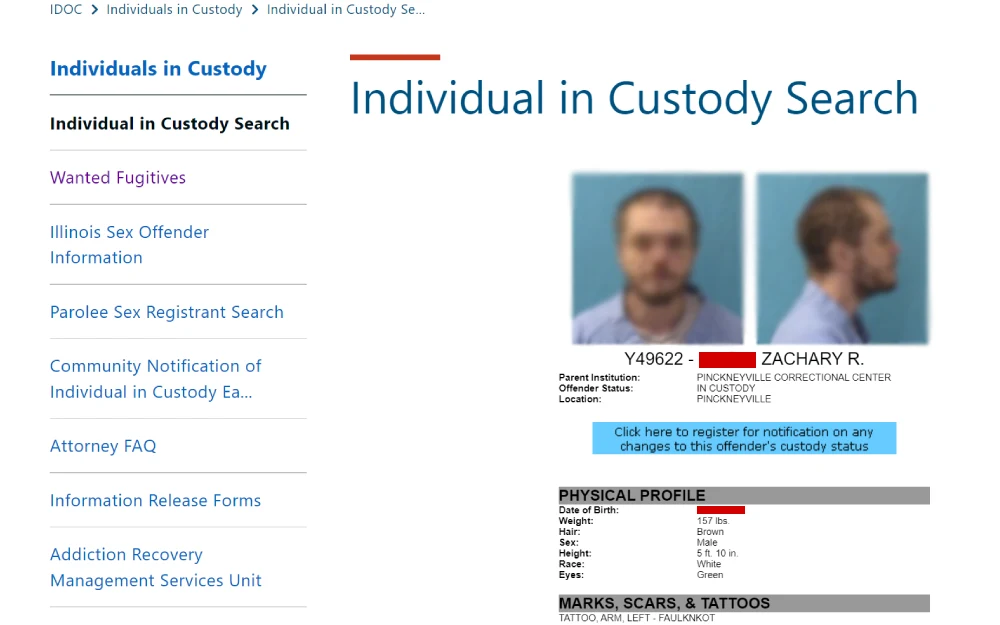
Another way to find out if you have a warrant is to look up court records online. The state of Illinois has a Unified Court Record Database, which contains existing case data from all of its 102 counties.
However, only registered members including attorneys, the parties to the existing legal matters and judges can access the portal. So, county-level court record searches can provide useful information
Citizens can find out whether any type of warrant could be visible on their background checks. This process involves contacting any Illinois law enforcement or correctional agency to run a fee-based criminal history record check based on the requester’s fingerprints and identification.6
Search for Warrants via City & County Agencies or Courts (Illinois)
To find if someone has a warrant in Illinois at the local (county) level, any of these online search methods can be useful:
- Visiting the local sheriff’s office to run an Illinois warrant search covering the entire county, including its cities and towns
- Finding online court records on the local circuit court clerk’s website if it provides free access to cases and docket information
Here are some of the most populous counties in Illinois and their preferred methods of allowing people to check if they have a warrant in their name.
Cook County: Everyone has the right to look up Cook County warrants. The Cook County Sheriff’s Office serves warrants issued for both criminal and civil matters that could range from a civil contempt of court charge, to a willful failure of a non-custodial parent to pay court-ordered child support.
The official website does not have an online search feature to look up active arrest warrant records. The county sheriff may be contacted for this purpose.
The Cook County Department of Corrections (CCDOC) allows the public to locate a detainee/arrestee in Cook County Jail who might have been incarcerated following the execution of a warrant.7
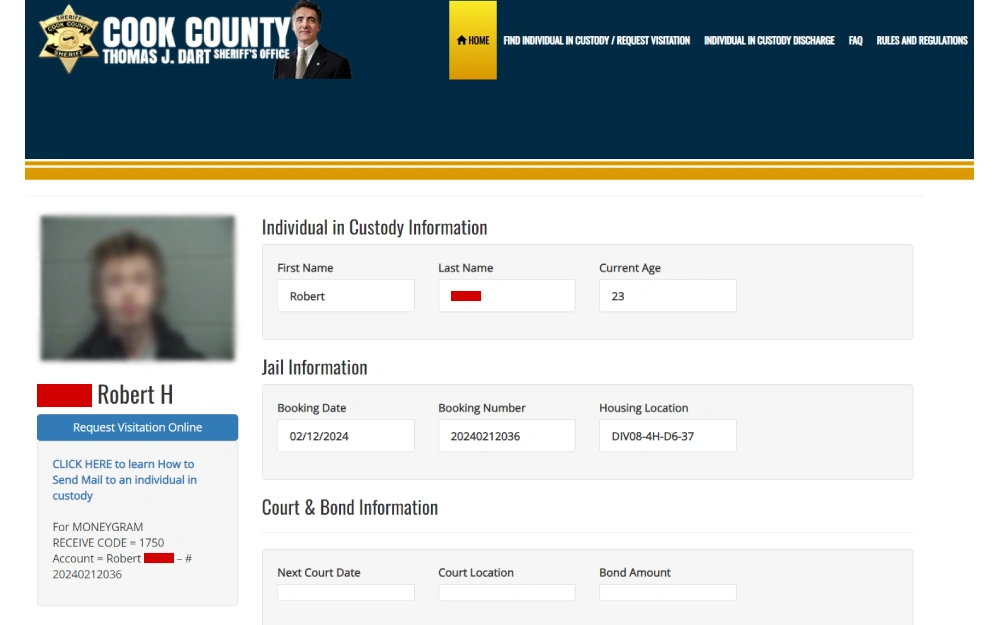
To enquire about misdemeanor warrants including those with felony offenses, anyone can call, send an email or go to any of the judicial districts as directed on the Cook County Safety and Justice Challenge (SJC)’s pamphlet.
Alternatively, a Cook County warrant check can be performed by using Online Court Case Lookup Tool provided by the Clerk of the Circuit Court of Cook County. For current and very recent cases, interested parties can visit the nearest courthouse, and use the Warrant Case Search Help Guide.
DuPage County: Residents of DuPage County, Illinois can search for pending warrants in the county by either calling the Warrants Division, sending email or appearing in person at the sheriff’s office, as directed on their website.
No public online portal is available on the website to search for active warrants, however, arrest records may be checked using the Inmates Search By Name Tool.8 In addition, the office provides a section to view DuPage County Sheriff’s Most Wanted List. For further guidance, refer to the steps for accessing all DuPage County warrant details.
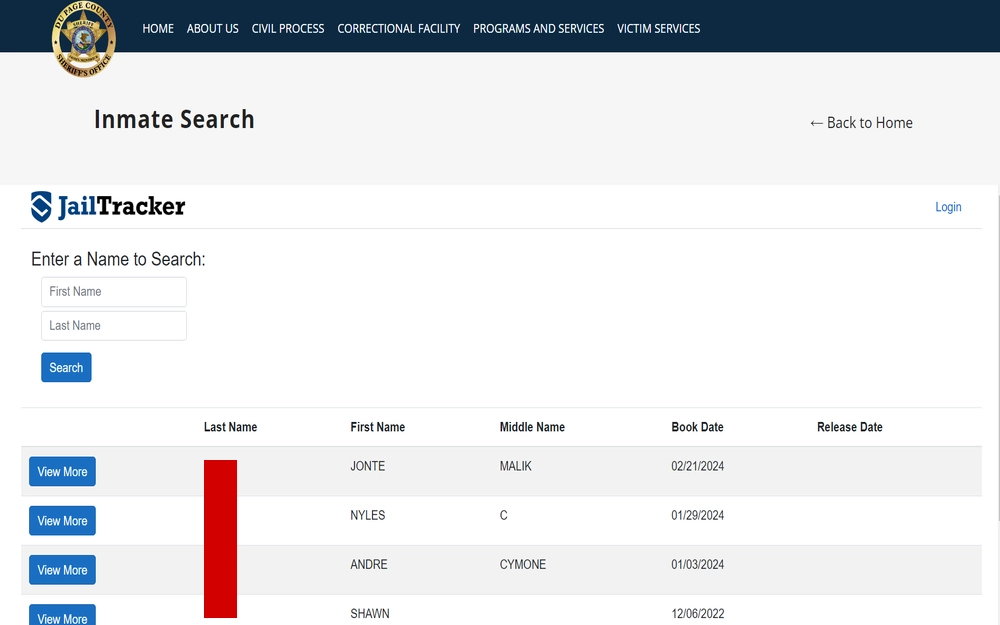
Another approach is to find warrant-related court cases heard at the DuPage county courthouse using the free Court Case Lookup Tool.9 Users can search a case by name, case or ticket number and also pay outstanding fines and fees (if applicable) online through this portal.
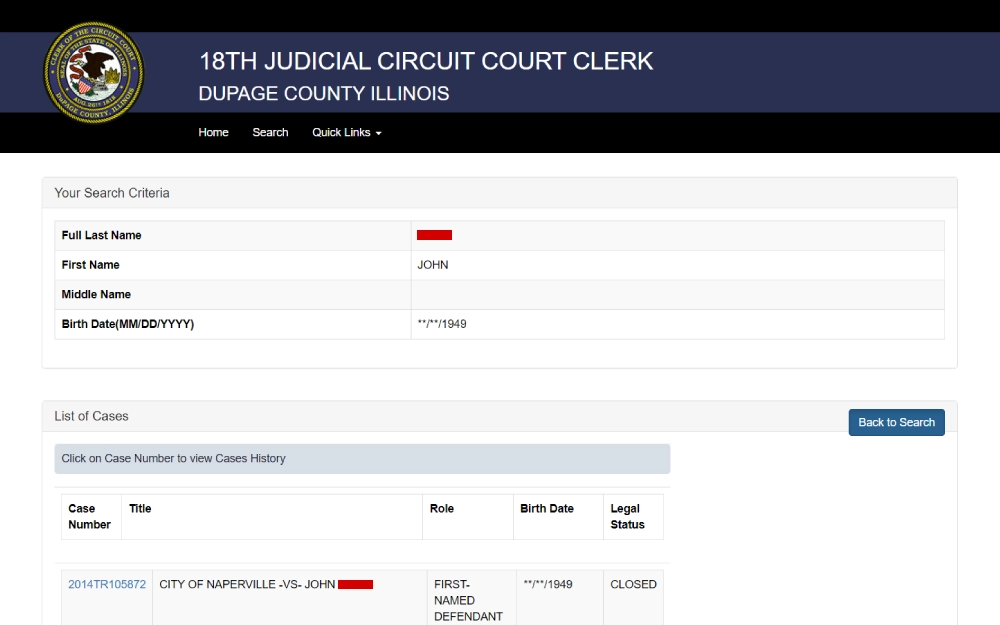
For further inquiries regarding criminal and traffic cases in DuPage County, the researcher may submit a Circuit Court Clerk Public Information Application or order copies of actual documents from a case file.
Kane County: To obtain information on active warrants in Kane County, people can speak with a representative of the Civil/Warrants Division of the Sheriff’s Office at 630-208-2015.
To see if any warrant or body attachment has been issued against someone in Kane County, Illinois, the inquirer may come into the Clerk of the Circuit Court Office and review their court file at the address provided on the website of the department.
McHenry County: The Criminal Investigations Department of McHenry County Sheriff’s Office maintains the Most Wanted List displaying some of the area’s most dangerous offenders with pending warrants.
To search the status of a warrant-related case in McHenry County, anyone can access the Online Public Case Search Portal provided by the Clerk of the Circuit Court.10
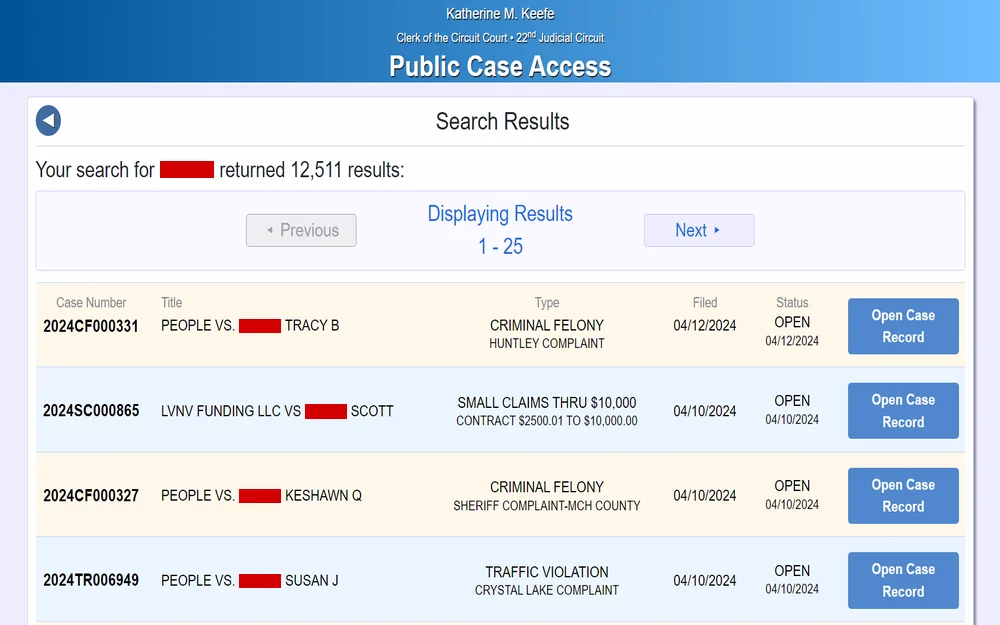
Will County: Anyone can do a public warrant search through the government-endorsed Will County Warrants Search Tool which can be accessed for free. In addition, they may use the Court Case Lookup Tool provided by the Will County Circuit Clerk.11
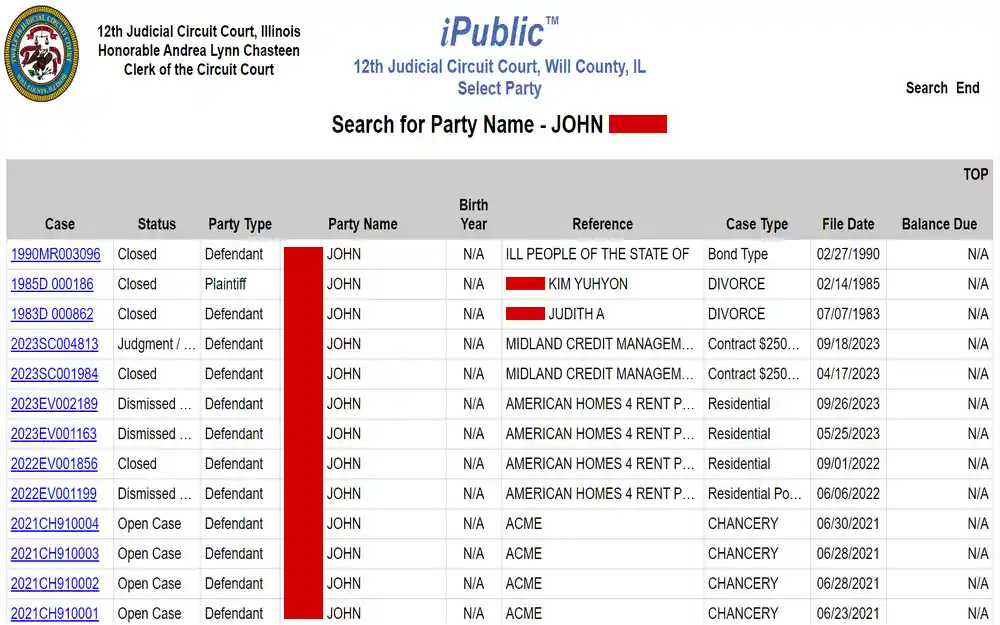
Some of the abovementioned county sheriffs do not offer the lists of their active warrants. Here are some agencies that do:
- Lake County Active Warrants List
- McDonough County Fugitives
- Tazewell County Warrants Lookup
- Peoria County Courthouse Public Warrant Information
- Knox County’s Most Wanted
Recent entries made in the court offices or law enforcement agencies may not be immediately reflected on their sites. If someone is worried that they might have a warrant in a specific county, the relevant sheriff’s office staff can be contacted to run a free arrest warrant check on their name.
County sheriff and city police departments are different entities. So, interested persons can visit a city police department’s website that features arrest records and active warrants information in the city. Searchers may also find the following resources helpful:
- Chicago Police Department Active Arrest Warrants
- City of Aurora Warrant Lookup Tool
- City of Highland Park Warrant Lists
Residents may also visit their nearest courthouse to approach the Clerk of the Court, and request a search (even if they have minor and major infractions) on their name/identification. This will give them the opportunity to resolve their cases and avoid being unexpectedly arrested during an Illinois warrant roundup.
Go Beyond Illinois & Look Up Federal Warrants
Wanted persons, also referred to as fugitives, are criminals escaping from the original jurisdiction where the warrant against them was issued.
Curious persons may wish to extend their search beyond the state and look for active arrest warrants issued by federal government agencies including the following:
- FBI’s List of Top Ten Most Wanted Fugitives and Most Wanted List of Criminals
- ATF’s Most Wanted List
- All Fugitives List by the U.S. Drug Enforcement Administration (DEA)
- U.S. Marshals Service’s List of 15 Most Wanted Fugitives and Profiled Fugitives
Additionally, individuals can also use the Public Access Court Electronic Records (PACER) to find federal arrest and search warrants. This tool allows users to search for a person’s name. It is important to note that this requires fees. Fees charges based on the number of pages.12
Another option is by consulting with the criminal defense attorney. Legal professionals can assist you with submitting a Freedom of Information Act (FOIA) Request through the U.S. Marshals Service.13
Note that misuse of warrant information may incur a civil or criminal liability. The information obtained through a search should be used only for lawfully acceptable purposes such as to be aware and alert, or to have these individuals captured and brought to justice.
Common Types of Warrants in Illinois & When They’re Issued
When it comes to performing an Illinois warrant search, understanding the different types issued is essential.
If a government agency’s website displays any of the following as an ‘active warrant’, it means that the warrant is ‘outstanding’, it hasn’t been executed, resolved or withdrawn/quashed by the issuing court.
Arrest Warrants: An Illinois arrest warrant is a court-issued document commanding a police officer or a county sheriff to catch and take a person into custody.14
An arrest can be made without a warrant when there are reasonable grounds to suspect that the accused has committed or is in the process of committing a crime (725 ILCS 5/ Code of Criminal Procedure, from Ch. 38).
A warrant of arrest in Illinois may be in connection with a serious criminal offense such as a forcible felony or violent crime, arson, damage or trespass to property, unlawful use of weapons or substances, gambling, bribery, parole violation or failure to meet the conditions of mandatory supervised release etc.
An arrest warrant may involve misdemeanors (offenses less severe than a felony) as well as violations of traffic and local governments/municipal rules. Some common examples are petty theft, drunk driving (DUI), harassment, disorderly conduct, speeding, and illegal parking.
Minor traffic offenses and violations of the local ordinance do not generally lead to an arrest warrant being ordered against the offender. They can be resolved typically with the payment of fine, court costs and restitution and, but in some cases, the driver’s license can be suspended.
Search Warrants: A judge may issue a search warrant in Illinois, giving the police the authority to enter a private property to search for a specific person or particular items (e.g., to retrieve stolen goods, a kidnapped person or other evidence of a crime).
The issuance of an Illinois search warrant is not required to stop any person for temporary questioning and search (also known as “stop-and-frisk” as pursuant to 725 ILCS 5/107-14) based on a “reasonable suspicion” (e.g. they appear to be unsteady, dangerous and armed).
Furthermore, a peace officer may carry out a warrantless search based on a “probable cause”. For instance, if an occupant of a car is driving while impaired by alcohol or drugs, a police officer has the power to search their vehicle without a warrant to look for additional incriminating evidence.
The police or other law enforcement personnel are obligated to meet the constitutional and statutory requirements when executing either a search or arrest warrant in the state. For example, a search warrant must be based on legal grounds and executed lawfully pursuant to Illinois Statutes 725 – Code of Criminal Procedure to be valid.
Otherwise, the defendant has the right to file a motion to ”quash” a search warrant and suppress evidence obtained through the search.
Bench Warrants/Body Attachment Order: A judge can directly issue a body attachment permitting a county sheriff or police department to arrest a person and bring them into the courtroom.
This is different from “summons” “citation” or “notice to appear” — documents to notify a person that he or she is required to appear in court on a certain time or pay their fines/penalties as listed on the summons/citations.
For example, a person who has received a citation for a traffic infraction (e.g., a regular traffic ticket), would not be subject to arrest and trial.
However, if they fail to appear for a court hearing on the scheduled date in response to the citation or fail to comply with the terms of the citation, a body attachment coupled with a warrant of arrest can be issued on their name.
While general arrest warrants mostly involve criminal cases, a body attachment typically stems from a civil disobedience to a previous court order, leading to the respondent’s/defendant’s arrest.
A parent/guardian may face a bench warrant in Illinois if they fail to participate in a juvenile court proceeding concerning their minor child.15
Dealing With Warrants & Notifying or Reporting Persons of Interest in IL
If someone has information on persons listed on an Illinois warrant database, they can contact the respective agency to verify the status of the warrant or submit an anonymous tip using their non-emergency number.
The State Police’s Division of Criminal Investigation may be reached by calling 217-782-1320.16
For local tip lines, citizens may contact the appropriate law enforcement agency, and also refer to the Illinois State Crime Stoppers Local Programs.
Individuals who are aware that they have a warrant, may seek assistance from an attorney at the earliest, because the best way to deal with a warrant is to take care of it immediately. They may also inform a friend, a family member or a trusted person who can help them address the situation.
An outstanding warrants can be cleared in Illinois, for example, a bench warrant can be removed by appearing in court and requesting the judge to recall the warrant. A warrant can also be addressed by paying court-ordered fines and fees.
Visit the Will County Sheriff’s Warrant FAQ Section for additional helpful information.
Those who failed to appear for a court date or a warrant of arrest has been issued on their name for some other reasons, they may turn themselves in by going to their nearest police station. This will help them avoid any further negative consequences e.g., additional penalties or prison sentences.
Anyone arrested in Illinois can refer to the State Bar Association’s Guidelines to understand their rights.
Those who need a lawyer can visit the government-endorsed website Illinois Lawyer Finder or call them at 800-922-8757. For those who cannot afford costly legal services can use the Illinois State Bar Association’s location-based legal-aid recommendations.17
By carrying out an Illinois warrant search, anyone can find out if there is a legal matter that needs immediate attention, which allows them to take necessary actions to safeguard their interests and rights in a timely manner.
Those seeking further details on anyone in the state can rely on the Illinois free public information search overview (for guidance on finding background check reports, marital documents, property ownership, and much more) along with the instructions for obtaining arrest and criminal records in IL.
References
1Illinois General Assembly. (n.d.). Illinois Compiled Statutes. Retrieved April 12, 2024, from <https://www.ilga.gov/legislation/ilcs/ilcs3.asp?ActID=85>
2Illinois General Assembly. (n.d.). Confidentiality and accessibility of juvenile court records. Retrieved April 12, 2024, from <https://www.ilga.gov/legislation/ilcs/fulltext.asp?DocName=070504050K1-8>
3Illinois General Assembly. (n.d.). Exemptions. Retrieved April 12, 2024, from <https://www.ilga.gov/legislation/ilcs/fulltext.asp?DocName=000501400K7>
4Illinois Department of Corrections. (n.d.). Offender Search. Retrieved April 12, 2024, from <https://idoc.illinois.gov/offendersearch.html>
5Illinois Department of Corrections. (2024). Individual in Custody Search. Retrieved April 12, 2024, from <https://idoc.illinois.gov/offender/inmatesearch.html>
6Illinois State Police. (n.d.). Viewing My Record. Retrieved April 12, 2024, from <https://isp.illinois.gov/BureauOfIdentification/MyRecord>
7Cook County Sheriff’s Office. (2024). Individual in Custody Name. Retrieved April 12, 2024, from <https://iic.ccsheriff.org/IndividualInCustodyLocator/Search>
8DuPage County Sheriff’s Office. (2024). Enter a Name to Search. Retrieved April 12, 2024, from <https://www.dupagesheriff.org/inmateSearch>
9Eighteenth Judicial Circuit Court of Illinois. (2024). Search by Case Name. Retrieved April 12, 2024, from <https://epay.18thjudicial.org/Clerk/allsearch.do>
10Clerk of the Circuit Court. (2024). Case Search. Retrieved April 12, 2024, from <https://caseinfo.mchenrycountyil.gov/pca/Home/Search>
11Twelfth Judicial Circuit Court of Illinois. (2024). Please enter the Search Criteria. Retrieved April 12, 2024, from <https://ipublic.il12th.org/>
12Public Access to Court Electronic Records (PACER). (n.d.). PACER pricing: How fees work. Retrieved April 12, 2024, from <https://pacer.uscourts.gov/pacer-pricing-how-fees-work>
13U.S. Marshals Service. (n.d.). Freedom of Information Act. Retrieved April 12, 2024, from <https://www.usmarshals.gov/freedom-of-information-act>
14Illinois General Assembly. (n.d.). Definitions. Retrieved April 12, 2024, from <https://ilga.gov/legislation/ilcs/documents/072500050K107-1.htm>
15Illinois Juvenile Justice Commission. (2021). Raising the Age of Juvenile Court Jurisdiction. Retrieved April 12, 2024, from <https://ijjc.illinois.gov/wp-content/uploads/2021/08/IJJC-Raising-the-Age-Report.pdf>
16Illinois State Police. (n.d.). Division of Criminal Investigation. Retrieved April 12, 2024, from <https://isp.illinois.gov/CriminalInvestigations>
17Illinois State Bar Association. (n.d.). Can’t Afford a Lawyer? Retrieved April 12, 2024, from <https://www.isba.org/public/cantaffordalawyer>
